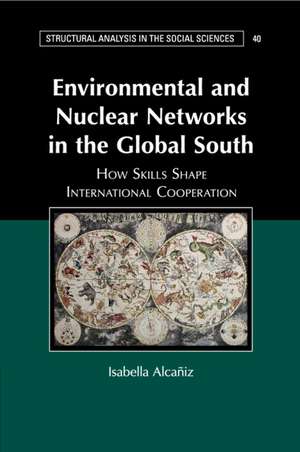Environmental and Nuclear Networks in the Global South: How Skills Shape International Cooperation: Structural Analysis in the Social Sciences, cartea 40
Autor Isabella Alcañizen Limba Engleză Paperback – 24 iul 2018
| Toate formatele și edițiile | Preț | Express |
|---|---|---|
| Paperback (1) | 283.03 lei 6-8 săpt. | |
| Cambridge University Press – 24 iul 2018 | 283.03 lei 6-8 săpt. | |
| Hardback (1) | 697.28 lei 6-8 săpt. | |
| Cambridge University Press – 17 aug 2016 | 697.28 lei 6-8 săpt. |
Din seria Structural Analysis in the Social Sciences
-
 Preț: 411.44 lei
Preț: 411.44 lei -
 Preț: 232.67 lei
Preț: 232.67 lei -
 Preț: 394.00 lei
Preț: 394.00 lei -
 Preț: 195.77 lei
Preț: 195.77 lei -
 Preț: 306.57 lei
Preț: 306.57 lei -
 Preț: 226.46 lei
Preț: 226.46 lei -
 Preț: 289.30 lei
Preț: 289.30 lei -
 Preț: 287.48 lei
Preț: 287.48 lei -
 Preț: 238.07 lei
Preț: 238.07 lei -
 Preț: 351.15 lei
Preț: 351.15 lei -
 Preț: 338.80 lei
Preț: 338.80 lei - 11%
 Preț: 546.03 lei
Preț: 546.03 lei -
 Preț: 434.92 lei
Preț: 434.92 lei -
 Preț: 286.30 lei
Preț: 286.30 lei -
 Preț: 378.11 lei
Preț: 378.11 lei -
 Preț: 323.65 lei
Preț: 323.65 lei -
 Preț: 334.16 lei
Preț: 334.16 lei -
 Preț: 284.56 lei
Preț: 284.56 lei -
 Preț: 236.40 lei
Preț: 236.40 lei -
 Preț: 349.80 lei
Preț: 349.80 lei -
 Preț: 300.79 lei
Preț: 300.79 lei -
 Preț: 421.39 lei
Preț: 421.39 lei -
 Preț: 284.56 lei
Preț: 284.56 lei -
 Preț: 368.31 lei
Preț: 368.31 lei - 11%
 Preț: 520.83 lei
Preț: 520.83 lei -
 Preț: 277.97 lei
Preț: 277.97 lei -
 Preț: 381.45 lei
Preț: 381.45 lei - 11%
 Preț: 646.96 lei
Preț: 646.96 lei -
 Preț: 250.30 lei
Preț: 250.30 lei -
 Preț: 208.61 lei
Preț: 208.61 lei
Preț: 283.03 lei
Nou
Puncte Express: 425
Preț estimativ în valută:
54.17€ • 56.34$ • 44.72£
54.17€ • 56.34$ • 44.72£
Carte tipărită la comandă
Livrare economică 14-28 aprilie
Preluare comenzi: 021 569.72.76
Specificații
ISBN-13: 9781316604472
ISBN-10: 1316604470
Pagini: 229
Ilustrații: 7 b/w illus. 5 colour illus. 10 tables
Dimensiuni: 153 x 230 x 15 mm
Greutate: 0.34 kg
Editura: Cambridge University Press
Colecția Cambridge University Press
Seria Structural Analysis in the Social Sciences
Locul publicării:New York, United States
ISBN-10: 1316604470
Pagini: 229
Ilustrații: 7 b/w illus. 5 colour illus. 10 tables
Dimensiuni: 153 x 230 x 15 mm
Greutate: 0.34 kg
Editura: Cambridge University Press
Colecția Cambridge University Press
Seria Structural Analysis in the Social Sciences
Locul publicării:New York, United States
Cuprins
1. Why do bureaucrats cooperate? International inter-agency networks in the Global South; 2. Bureaucrats across borders; 3. Skill formation, economic crisis, and expert networks in the nuclear sectors of Argentina and Brazil; 4. International inter-agency cooperation in nuclear energy, science, and technology (NEST); 5. Explaining international inter-agency cooperation in nuclear energy, science, and technology (NEST); 6. International inter-agency cooperation in the protection of the global environment; 7. Explaining international inter-agency cooperation in the protection of the environment; 8. After austerity; 9. Conclusion: the hidden costs of low skills.
Recenzii
'Environmental and Nuclear Networks in the Global South: How Skills Shape International Cooperation is an indispensable book for furthering our understanding of technocratic bureaucracies and transnational policy networks. It provides important contributions to comparative political economy, while reshaping the study of environmental and NEST cooperation in the Global South. Moreover, its research design offers an excellent example of scholarly work based on mixed methods by combining the qualitative evidence gathered in numerous in-depth elite interviews with the quantitative results generated by complex social network analysis.' Maria Victoria Murillo, Columbia University, New York
'Alcañiz goes behind the scenes of global policy-making and finds a vibrant space where bureaucrats cooperate to creatively solve problems. She argues persuasively - using sophisticated network analysis and well-chosen case studies - that this process also deepens global inequalities, as the bureaucrats are most closely networked with those with similar skills and resources levels.' Kathryn Hochstetler, London School of Economics and Political Science
'Alcañiz goes behind the scenes of global policy-making and finds a vibrant space where bureaucrats cooperate to creatively solve problems. She argues persuasively - using sophisticated network analysis and well-chosen case studies - that this process also deepens global inequalities, as the bureaucrats are most closely networked with those with similar skills and resources levels.' Kathryn Hochstetler, London School of Economics and Political Science
Notă biografică
Descriere
The first comprehensive study to explain the workings of transgovernmental environmental and nuclear cooperation across the so-called 'Global South'.
















